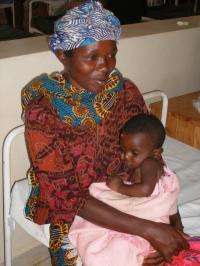RI Hospital finds dehydration scales not accurate for determining dehydration levels in children

A physician team from Rhode Island Hospital led a study to evaluate the accuracy of the commonly used dehydration scales as they apply to children in a low-income country. Based on their experience in Rwanda, the researchers determined that none of the three scales were accurate predictors of severe dehydration in children with diarrhea and/or vomiting. The team calls for further research to develop and validate new clinical scales with greater accuracy for use in low-income countries. Their findings are published in the International Journal of Emergency Medicine.
Dehydration due to acute gastroenteritis is one of the leading causes of mortality in children worldwide. Diarrhea has the highest incidence of any childhood disease in all regions of the world. It causes death in approximately 1.9 million children each year, accounting for 19 percent of all deaths in children under five.
In order to provide the most appropriate treatment for children diagnosed with dehydration, the severity of the dehydration must be determined. This is particularly true in low- and middle-income countries where many patients travel several hours to reach a health care facility, and resources such as IV fluids and hospital beds are scarce.
There are currently three scales that are used most commonly to determine dehydration status that use clinical signs. They are the World Health Organization (WHO) scale, the Gorelick scale and the Clinical Dehydration Scale (CDS). These scales predict the percent of dehydration for slightly different age groups. To date, only the CDS has been prospectively validated against the gold standard, which is percent of weight change with rehydration. None of the scales, however, have been validated in low- or middle-income countries where disease patterns may differ from high-income countries, and patients often present later in the course of the disease.
With that in mind, Adam Levine, M.D., M.P.H., an attending emergency medicine physician at Rhode Island Hospital, designed a study to determine the accuracy of the scales while working in Rwanda. He brought home data, which was analyzed by Kimberly Pringle, M.D., an emergency medicine resident at Rhode Island Hospital. Their study involved 52 children. They rated all the children using all three scales.
Pringle says, "In this study, we found that the WHO scale, the Gorelick scale and the CDS, when performed by general practice physicians and nurses in a resource-limited setting, were not accurate predictors of severe dehydration in children with diarrhea and/or vomiting. Due to the high prevalence and significant morbidity associated with diarrhea in children throughout the world, further research is necessary to develop and validate new clinical scales or other diagnostic tools with greater accuracy for assessing dehydration in children, especially in resource-limited and low-income settings."
"This was an incredible opportunity to work with an international team of researchers on a topic that is of vital importance to global child health," says Levine. "We are now working on a follow up study in Rwanda that we believe will lead to the development of better tools for assessing and managing dehydration in children with diarrhea around the world."















